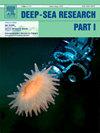Pressurised aquaria for the study of deep-water corals
IF 2.3
3区 地球科学
Q2 OCEANOGRAPHY
Deep-Sea Research Part I-Oceanographic Research Papers
Pub Date : 2025-05-15
DOI:10.1016/j.dsr.2025.104520
引用次数: 0
Abstract
A set of four identical pressurised mesocosms is presented, aiming at long-term incubations of deep-water corals, as deep as 3000 m. Care was also taken to enable practical boarding of these instruments on oceanographic ships. Four-month incubations of two scleractinian species (D. pertusum and M. oculata) originating from 800 m depth were achieved at the laboratory (including 3 months at 8 MPa pressure). Two of the aquaria were also operated during a 2-week cruise in the Bay of Biscay, focusing on the same species. Specific requirements for long-term studies are exposed and discussed, emphasizing resistance to corrosion and the possibility to feed fauna without decompression. The first-time long-term incubation of deep-water corals at in situ pressure opens perspectives for future studies, including investigations on deeper corals not yet accessible to laboratory experiments. The use of pressurised mesocosms may be of particular importance, considering the predicted consequences of ocean warming and acidification on the bathymetric distribution of reef-forming deep-water scleractinians.
研究深水珊瑚的加压水缸
提出了一套四个相同的加压中生态系统,旨在深水珊瑚的长期孵化,深达3000米。还注意使这些仪器能够实际登上海洋研究船上。在实验室对来自800 m深度的两种硬核菌(D. pertusum和m . oculata)进行了4个月的孵化(包括在8 MPa压力下的3个月)。其中两个水族馆也在比斯开湾进行了为期两周的巡航,重点关注同一物种。对长期研究的具体要求进行了暴露和讨论,强调耐腐蚀和不减压喂养动物群的可能性。首次在原位压力下对深水珊瑚进行长期孵化,为未来的研究开辟了前景,包括对尚未进行实验室实验的更深珊瑚的调查。考虑到海洋变暖和酸化对造礁深水硬壳生物的水深分布的预测后果,使用加压中生态系统可能特别重要。
本文章由计算机程序翻译,如有差异,请以英文原文为准。
求助全文
约1分钟内获得全文
求助全文
来源期刊
CiteScore
4.60
自引率
4.20%
发文量
144
审稿时长
18.3 weeks
期刊介绍:
Deep-Sea Research Part I: Oceanographic Research Papers is devoted to the publication of the results of original scientific research, including theoretical work of evident oceanographic applicability; and the solution of instrumental or methodological problems with evidence of successful use. The journal is distinguished by its interdisciplinary nature and its breadth, covering the geological, physical, chemical and biological aspects of the ocean and its boundaries with the sea floor and the atmosphere. In addition to regular "Research Papers" and "Instruments and Methods" papers, briefer communications may be published as "Notes". Supplemental matter, such as extensive data tables or graphs and multimedia content, may be published as electronic appendices.

 求助内容:
求助内容: 应助结果提醒方式:
应助结果提醒方式:


